 Petzlover
Petzlover Kanni is originated from India but Sage Koochee is originated from Afghanistan. Kanni may grow 22 cm / 8 inches shorter than Sage Koochee. Kanni may weigh 58 kg / 127 pounds lesser than Sage Koochee. Both Kanni and Sage Koochee has almost same life span. Both Kanni and Sage Koochee has same litter size. Both Kanni and Sage Koochee requires Low Maintenance.
Kanni is originated from India but Sage Koochee is originated from Afghanistan. Kanni may grow 22 cm / 8 inches shorter than Sage Koochee. Kanni may weigh 58 kg / 127 pounds lesser than Sage Koochee. Both Kanni and Sage Koochee has almost same life span. Both Kanni and Sage Koochee has same litter size. Both Kanni and Sage Koochee requires Low Maintenance.
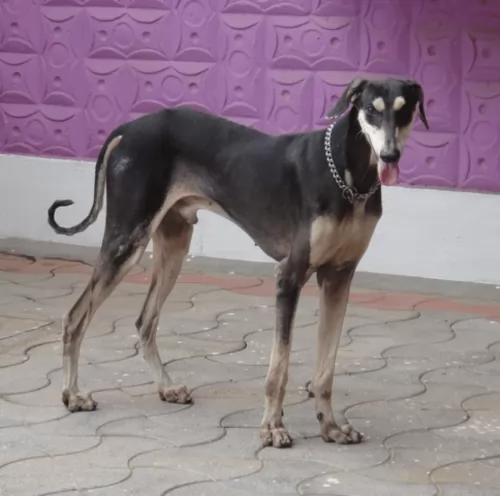 The Kanni dog is a rare South Indian Sighthound. It is also known as the Maiden's Beastmaster and this is because it is known to be protector and defender of its owner's property.
The Kanni dog is a rare South Indian Sighthound. It is also known as the Maiden's Beastmaster and this is because it is known to be protector and defender of its owner's property.
During ancient times, the dog was used for hunting but today it is essentially kept as a pet and it is registered with the Kennel Club of India.
 Known also as the Kuchi Dog, the Sage Koochee is a dog that was bred more for his characteristics than his looks. He was bred to be a protector and guardian and named after the Afghan Kochi people.
Known also as the Kuchi Dog, the Sage Koochee is a dog that was bred more for his characteristics than his looks. He was bred to be a protector and guardian and named after the Afghan Kochi people.
Referred to as the Kuchi or Sage Kuchi, this working dog has always helped nomads with guarding their caravans and livestock. The dog has genetic resemblance with the Central Asian Ovcharka but isn’t recognized as an official breed by any of the major kennel clubs.
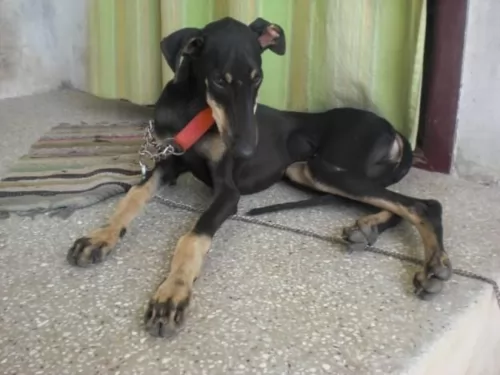 These dogs are tall, slim and deep chested, coming in two-color combinations, but it is the black and tan variety that is the true Kanni. There is also a cream variety. There are other color variations and each color has a unique name connected to it. The coat of the Kanni is short and smooth.
These dogs are tall, slim and deep chested, coming in two-color combinations, but it is the black and tan variety that is the true Kanni. There is also a cream variety. There are other color variations and each color has a unique name connected to it. The coat of the Kanni is short and smooth.
They are medium sized dogs standing at 62 to 67cm at the withers and weighing in the region of 18 – 22kg. When you first look at these dogs you might think of them as being similar to a Greyhound in looks. This is also because of their lean, muscular looks.
The eyes are a golden color, the nose black and the ears are a medium size and floppy with the long tail being semi-curved.
The Kanni has always been a hunting dog so he is used to being sharp, strong-willed, independent and alert as well as having some aggressive tendencies. It is also quite a reserved dog but he shows love and loyalty to his owner. He is independent and easy to train. It is a good thing to have him trained and socialized so that he is obedient to the simple commands you give him.
 The Sage Koochee is a large molosser dog, although they do vary quite a bit in height. This is because they generally come in 3 varieties.
The Sage Koochee is a large molosser dog, although they do vary quite a bit in height. This is because they generally come in 3 varieties.
They can stand at between 58 to 89cm in height and they weigh between 38 to 80kg. This is because this dog is divided into 3 types. The coat of this dog can be short, medium or long, and colors can vary quite a bit as well.
These are moderate, seasonal shedders. Their tails are usually docked to about 1/3 of their length and their ears have been traditionally docked too. They are very territorial and won’t show any tolerance to strangers coming onto the property. He also tends to be aggressive towards other dogs.
These dogs are tough and fierce and also immensely intelligent. Such a dog would have to be trained and socialized or you would land yourself with a strong-willed, disobedient dog.
Once they’ve had training, they are friendly, obedient and affectionate towards their owners, but aren't a good choice for children. They are extremely territorial and make good watchdogs,being prepared to fiercely protect their human family.
The very nature of this dog makes it not suitable for life in the city. It would be terribly frustrated in small spaces and can become aggressive.
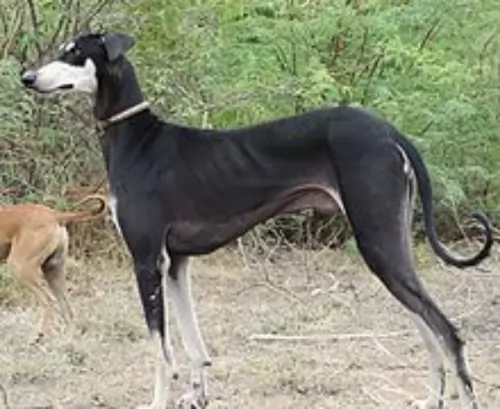 The Kanni looks much like your regular Doberman Pinscher but he has long tail and floppy ears. He is slim and agile but also powerful being able to have bursts of speed. It is why he requires a large place to run and play in, being better suited to a home with a large garden or farm.
The Kanni looks much like your regular Doberman Pinscher but he has long tail and floppy ears. He is slim and agile but also powerful being able to have bursts of speed. It is why he requires a large place to run and play in, being better suited to a home with a large garden or farm.
He is a playful, quiet dog but he has quite a bark on him and is known to be a good watchdog because of this. He is a protective dog too, devoted and loyal and making a splendid family pet.
 The Kuchi has always been vigilant with guarding livestock, and these tough dogs did the job of guardian and protector extremely well.
The Kuchi has always been vigilant with guarding livestock, and these tough dogs did the job of guardian and protector extremely well.
They’re hardy too, used to coping with extreme weather conditions, from hot deserts to freezing mountain areas. These dogs are powerful and independent and they are also dangerous.
With good training and socialization they can become loving and loyal, but they require a strong, firm owner, and don’t come as recommended if there are children in the home.
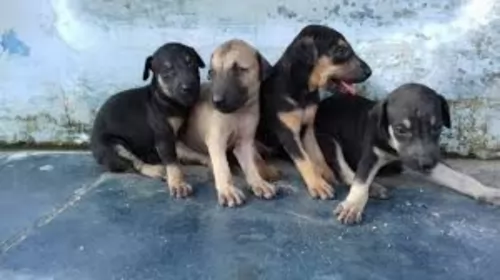 Not much is known about inherited health problems in this breed, and he can live up to a ripe old age of 16. It seems a pretty healthy dog, but still it helps to be aware of some of the more common dog illnesses that your pet can succumb to.
Not much is known about inherited health problems in this breed, and he can live up to a ripe old age of 16. It seems a pretty healthy dog, but still it helps to be aware of some of the more common dog illnesses that your pet can succumb to.
For first time dog owners it can be difficult knowing what health problems our beloved pets could suffer from. Every dog breed has certain diseases to which they are more prone to, but these are some common issues that most of our 4-legged friends will face -
This is a common dog health problem in India with the Kanni. There are so many things that disagree with their digestion. Most dogs may not want to eat their next meal, but when he is lethargic, he is hot and is vomiting, it is time to get your pet to the vet. This is because diarrhea causes rapid dehydration in dogs. To avoid diarrhea, steer clear of certain foods such as milk and dairy products as well as old, spoiled fatty foods. With diarrhea your dog must always have access to fresh, cool water.
This is a common dog disease, and ear infections can be painful and frustrating for your pet. He’ll scratch at his ear, shake his head and the inside of the ear may be red with a discharge. Check his ears for redness and try to keep them free from wax build up and dust.
Cleaning the ear is quite simple, and if you’re not sure how, the vet can do it quickly and effectively. Usually some dog ear cleaning solution on some cotton wool can do the trick. Ear infections are common in dogs like the Kanni with floppy ears.
It is essential to control fleas on your dog from word go. Fleas thrive in warm temperature and humidity and your pet will scratch, bite and lick at the spot. When you brush your pet, look through his fur for fleas and tell you vet about it if you discover ticks and fleas. A topical ointment could nip the problem in the bud. You may want to consider a flea collar for your pet.
Tapeworms, hookworms and roundworms for instance are commonly found in dogs, and even for healthy dogs, deworming tablets should be given from time to time. If your dog has worms, you’ll notice lethargy, loss of appetite, diarrhea and vomiting. It may be time to get your pet to the vet.
 The Kuchi breed is healthy and doesn’t have any particular health issues. Things to look out for are bloat, skin allergies, cancer and parasites.
The Kuchi breed is healthy and doesn’t have any particular health issues. Things to look out for are bloat, skin allergies, cancer and parasites.
Parasites are a common in many dogs. Fleas and ticks are external parasites, but intestinal parasites can be a real nuisance too and endanger your dog’s health.
These parasites live within the dog’s gastrointestinal tract. They can be a host of terrible worms such as roundworm, hookworms and tapeworm among others. The parasites are usually transmitted when the dog ingests contaminated food, soil or even feces.
These parasites can cause endless problems for the dog, from weight loss to diarrhea to vomiting. You will need to get your pet to the vet.
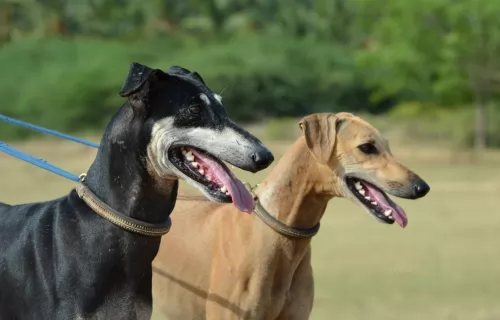 The Kanni is a low maintenance dog with his short coat. You can give him a good brush twice a week, check that his nails don't grow too long and also check his ears inside and out. Ticks and fleas are rife in hot weather and you want to give your dog a thorough check for these. You should also be checking your dog's teeth and brushing them 2 or 3 times a week. Dental problems can cause havoc with your dog's health.
The Kanni is a low maintenance dog with his short coat. You can give him a good brush twice a week, check that his nails don't grow too long and also check his ears inside and out. Ticks and fleas are rife in hot weather and you want to give your dog a thorough check for these. You should also be checking your dog's teeth and brushing them 2 or 3 times a week. Dental problems can cause havoc with your dog's health.
As a hunting breed, the Kanni is used to running so his needs for a good amount of exercise are quite high. While they do make good family pets, they hanker after wide open spaces and being busy. If you own one of these dogs, make sure that you exercise him often because otherwise he becomes frustrated and unhappy.
This dog has always been used to village life where he is free to roam wide open spaces. He is much more suited to country life than to city life, and as a pet, you will need to ensure that he receives a good amount of exercise.
Take him for walks, and if he's been socialized and trained, take him to the park and allow him off his leash to run.
The dog has always been fed traditional food such as porridge and milk but we know better now that dogs need protein too as well as a diet rich in vitamins and minerals to ensure his health.
You can feed him a top quality commercially manufactured dog food and add in some cooked chicken, rice and vegetables from time to time. It is expensive, but if you can, try and add in some raw meat occasionally as well. Your Kanni dog must always have access to fresh, clean water.
 A nutritious commercially manufactured dog food for large working dogs will be required for this strong, energetic dog. You want to provide it with some variety, so some homemade food added into the dry kibble twice a week will ensure he is healthy and content.
A nutritious commercially manufactured dog food for large working dogs will be required for this strong, energetic dog. You want to provide it with some variety, so some homemade food added into the dry kibble twice a week will ensure he is healthy and content.
Home-made food such as boiled chicken, brown rice or pasta and spinach, sweet potatoes and carrots all boiled slowly together will delight your pet. You just chop it up and add it to the dry kibble twice a week and your pet will never look back.
For his skin and coat, you can try to add in a little bit of raw meat occasionally.Dogs thrive on simple, consistent meals like this – nothing weird and spicy so as to avoid stomach upsets.
Groom your Kuchi dog by brushing him twice a week and check simultaneously for any lumps you may find on him.
Trim his nails.
Check his eyes and make sure they are clear with no signs of discharge.
Check inside the mouth for rotten or bad teeth as he can’t tell you if one is rotten and causing him tremendous pain and discomfort.
Make sure his vaccines are up to date to avoid life threatening canine diseases.
Provide him with a nice, warm dry place to sleep.
Make sure he has access to shade and sun when he’s outdoors.
Have him or her spayed or neutered to avoid puppies